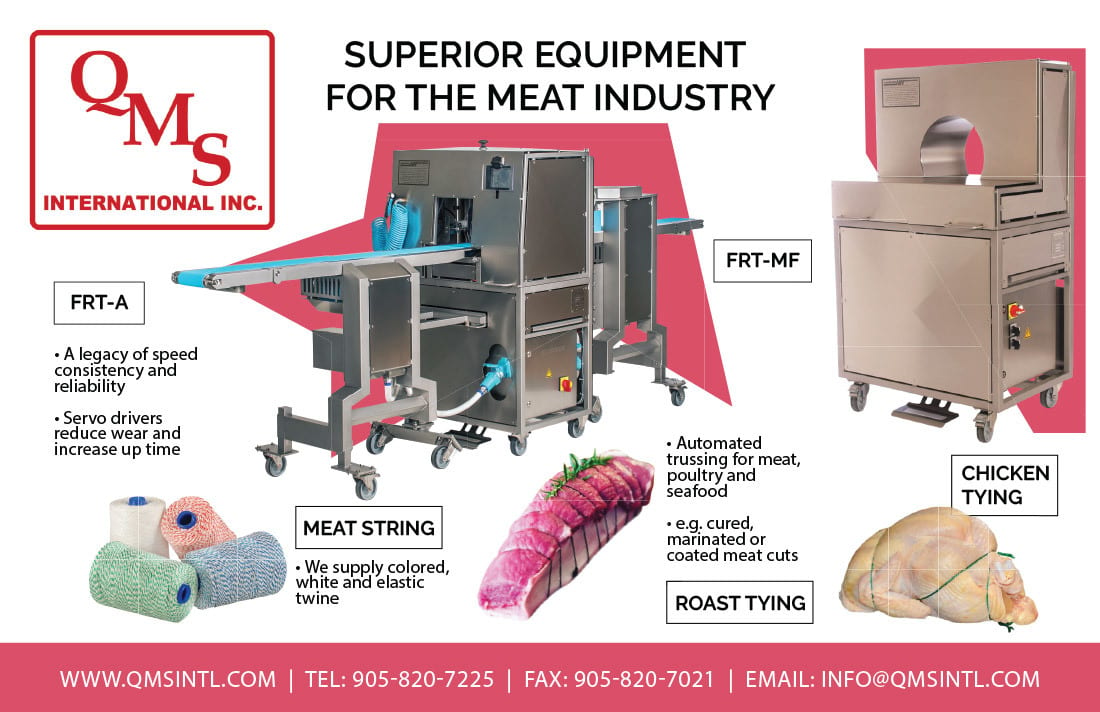2021 deli
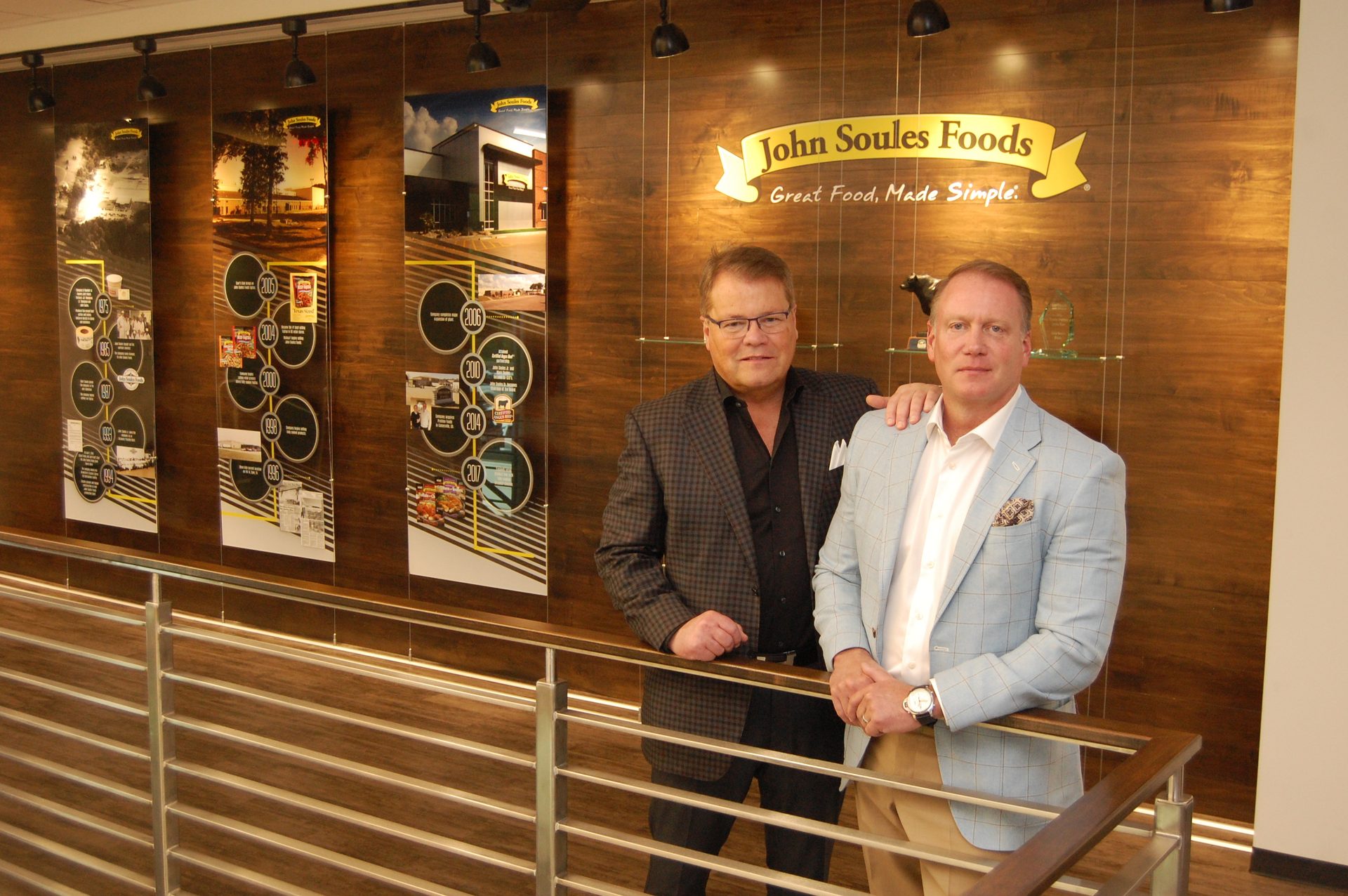
Show-‘Case’
facility
peaks
and Valley

Mark Soules (left) and John Soules Jr., co-CEOs of John Soules Foods
VALLEY, Ala. — Thriving during challenging times has been a recurring theme in the company history of John Soules Foods.
Under the leadership of co-CEO’s and brothers Mark Soules and John Soules Jr., the company has experienced a lot of change since their father, John Soules Sr., founded the company as a ground-beef operation.
Amid the marketplace disruptions caused by COVID-19, John Soules Foods posted record sales in 2020 — with 25% year-over-year growth — followed by another record-breaking year in 2021, with an additional 22% growth. The current year is following a similar arc, with 2022 sales so far continuing to set records by pacing at 22% dollar sales growth through the first quarter of the year. John Soules Foods has enjoyed its top five individual sales weeks in company history during Q1 of 2022.
Based on this record of success and the company’s state-of-the-art expansion in Valley, Ala., The National Provisioner is pleased to award John Soules Foods its 2022 Processor of the Year award.
Some of John Soules Foods recent product development and merchandising achievements include:
- Currently the market share leader with over 50% share of the refrigerated fully cooked strips category.
- The company is the exclusive licensing partner (fully cooked proteins) of “Hot Ones,” the YouTube pop culture show from First We Feast. The partnership began with a “Hot Ones” limited-time offering retail item at Walmart earlier this year, which became the company’s No. 3 item at Walmart in the frozen department and No. 5 overall. It contributed to 40% of John Soules Foods’ overall growth at Walmart in the frozen department in Q1. This summer, the limited-time item will be replaced by an everyday lineup of five individual items, each featuring a different Hot Ones® sauce.
- This summer, John Soules Foods becomes the exclusive licensing partner (fully cooked proteins) for Universal Studios, including the “Jurassic Park,” “Minions” and “Trolls” movie franchises. The timing aligns with the release of “Jurassic World 3: Dominion” in June, “Minions: The Rise of Gru” in July, “Trolls 3” in November 2023 and “Despicable Me 4” in July 2024.
By Andy Hanacek
editor-in-chief
Case Farms’ automation-driven renovation and expansion of its Winesburg, Ohio, processing plant sends a clear message that the Poultry Plant of the Future is NOW.
Not only has John Soules Foods experienced high-flying success with record sales and new-product development over the past 18 months, but it also built a highly automated, state-of-the-art processing plant in Valley, Ala., to push the company even higher.
By FRED WILKINSON
MANAGING EDITOR
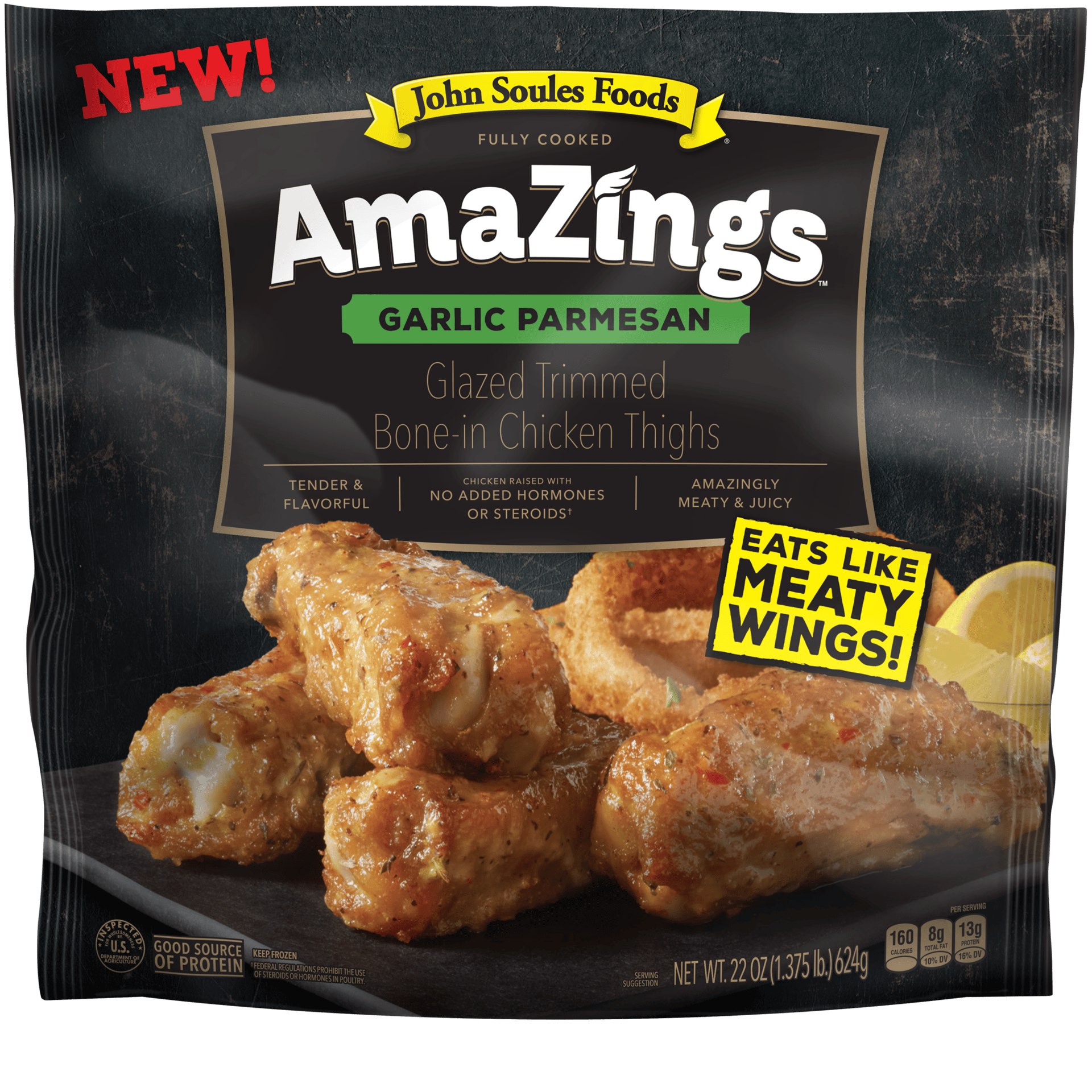
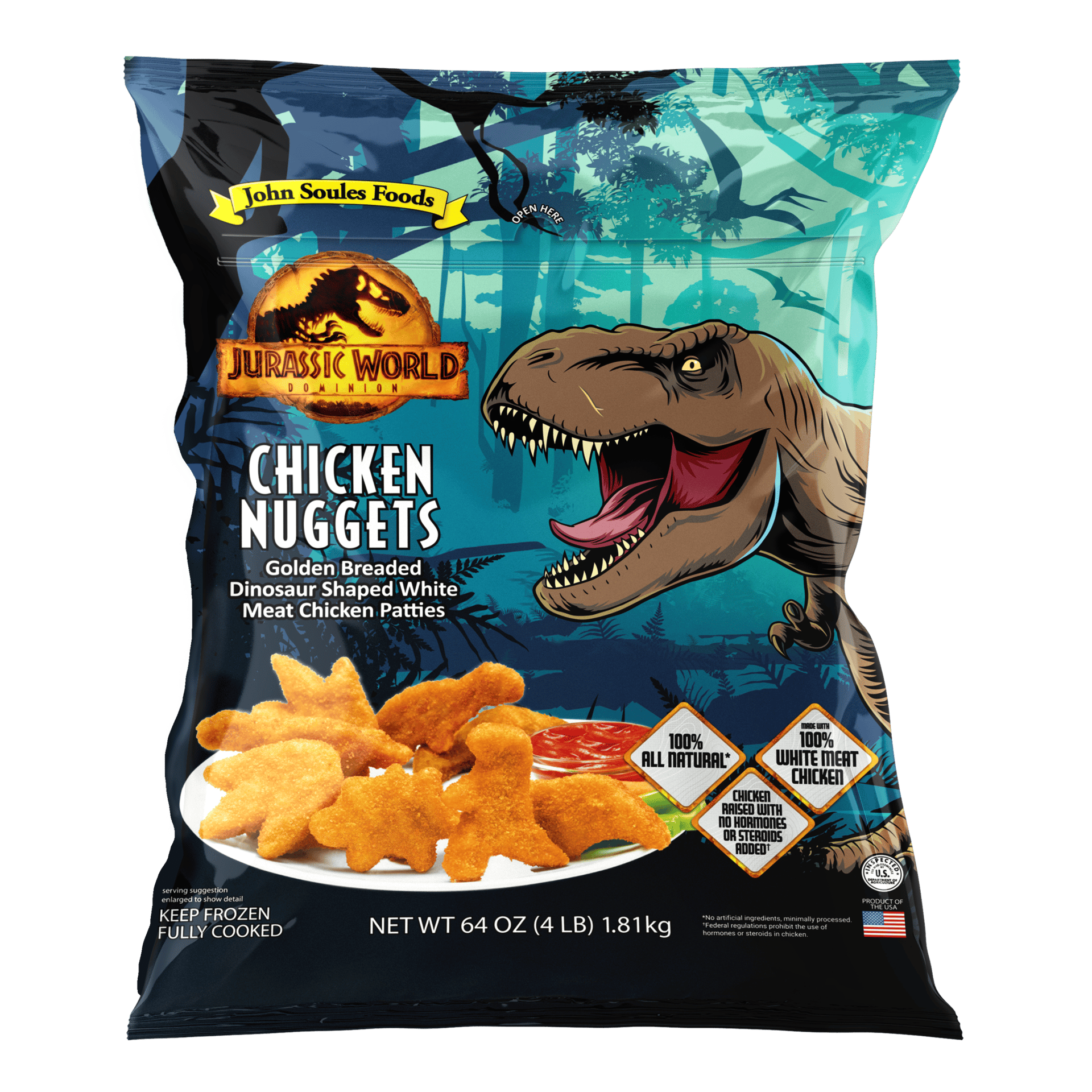
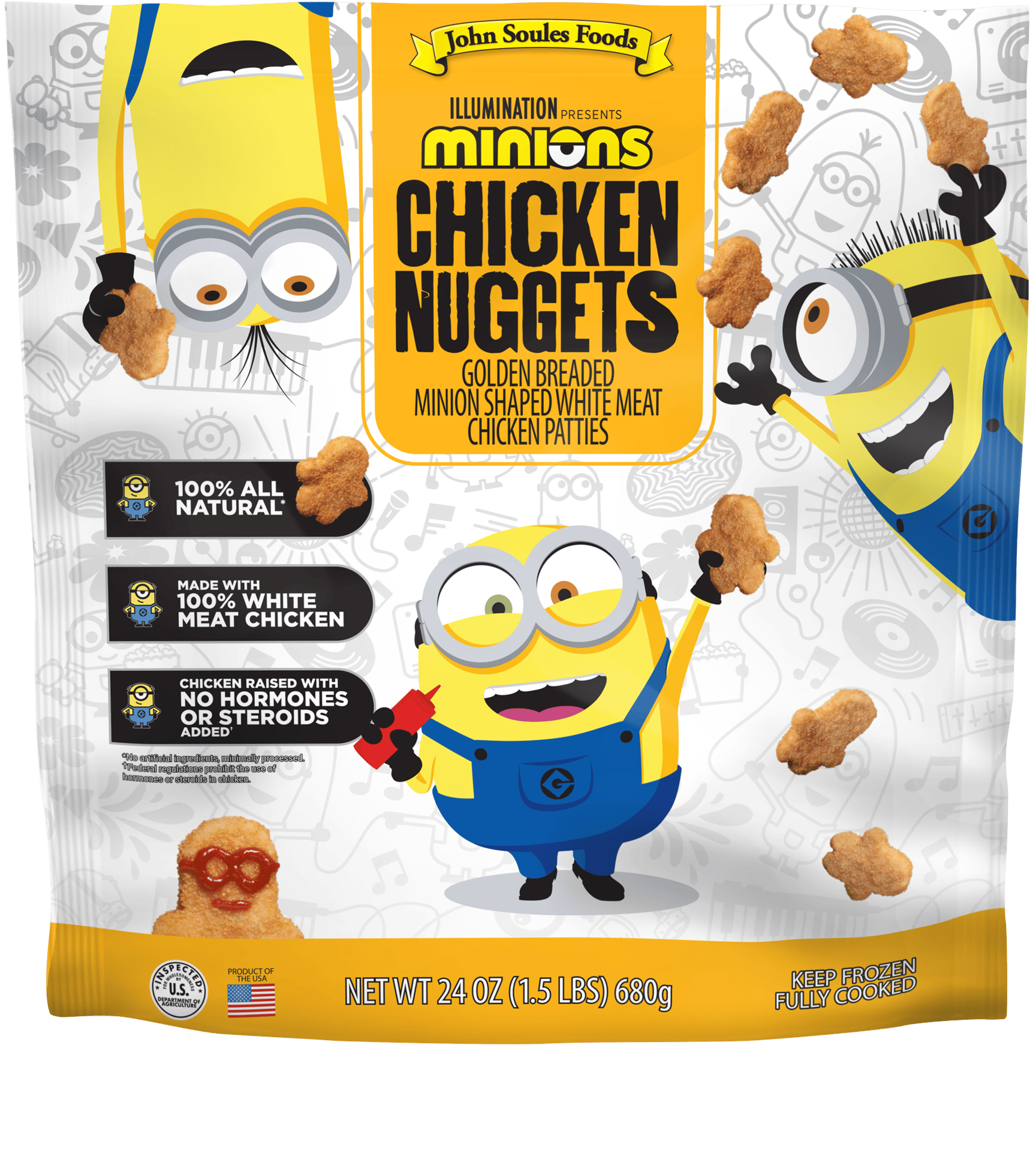
- The company introduced AmaZingsTM, a line of trimmed, bone-in chicken thighs that provide a “wing” eating experience, available in Buffalo, Honey BBQ, Garlic Parmesan and Lightly Seasoned flavors. With a limited launch at Walmart in March, everyday retail placement begins in summer 2022.
- In March, John Soules Foods launched individually packaged Chicken Bites at Sam’s Club in the refrigerated section. The six-pack of individually portioned 3-ounce packages is designed to give consumers flexibility for individual consumption — such as a salad topping or for snacking — and ties in with consumer interest in healthy eating and the rise in protein snacks. The item is currently available in a Thai Style Chili Teriyaki flavor.
Sixteen-year company veteran and Senior Director of Research & Development Lance Youngs leads a team of culinary professionals and food scientists that collaborates with marketing and sales to build an innovation pipeline and bring new products to market.
The innovation continues with packaging. A resealable package for John Soules Foods Rotisserie Seasoned Chicken recently won a Silver award for Technical Innovation in the 66th annual Flexible Packaging Achievement Awards competition. The packaging was recognized for a laser score that audibly “pops” when opened to assure consumers that the package has not been opened previously. The company’s Hot Ones Boneless Chicken Bites was also recognized as a 2022 American Package Design Award Winner by Graphic Design USA, via FoodStory Brands, which led the design efforts in conjunction with John Soules Foods and Complex Media.
John Soules Foods’ growth and innovation in product development and timely, high-profile product tie-ins alone would make it a worthy candidate for The National Provisioner’s Processor of the Year, but the clincher for the company’s win came from pulling off the design, construction and startup of its state-of-the-art plant in Valley, beginning the project during the pandemic and bringing it on line in September 2021.
Not surprisingly, that accomplishment is a point of pride.
“If we can get them in this plant, then we're going to bring in a customer,” John Jr. said during The National Provisioner’s exclusive visit to the facility this spring.
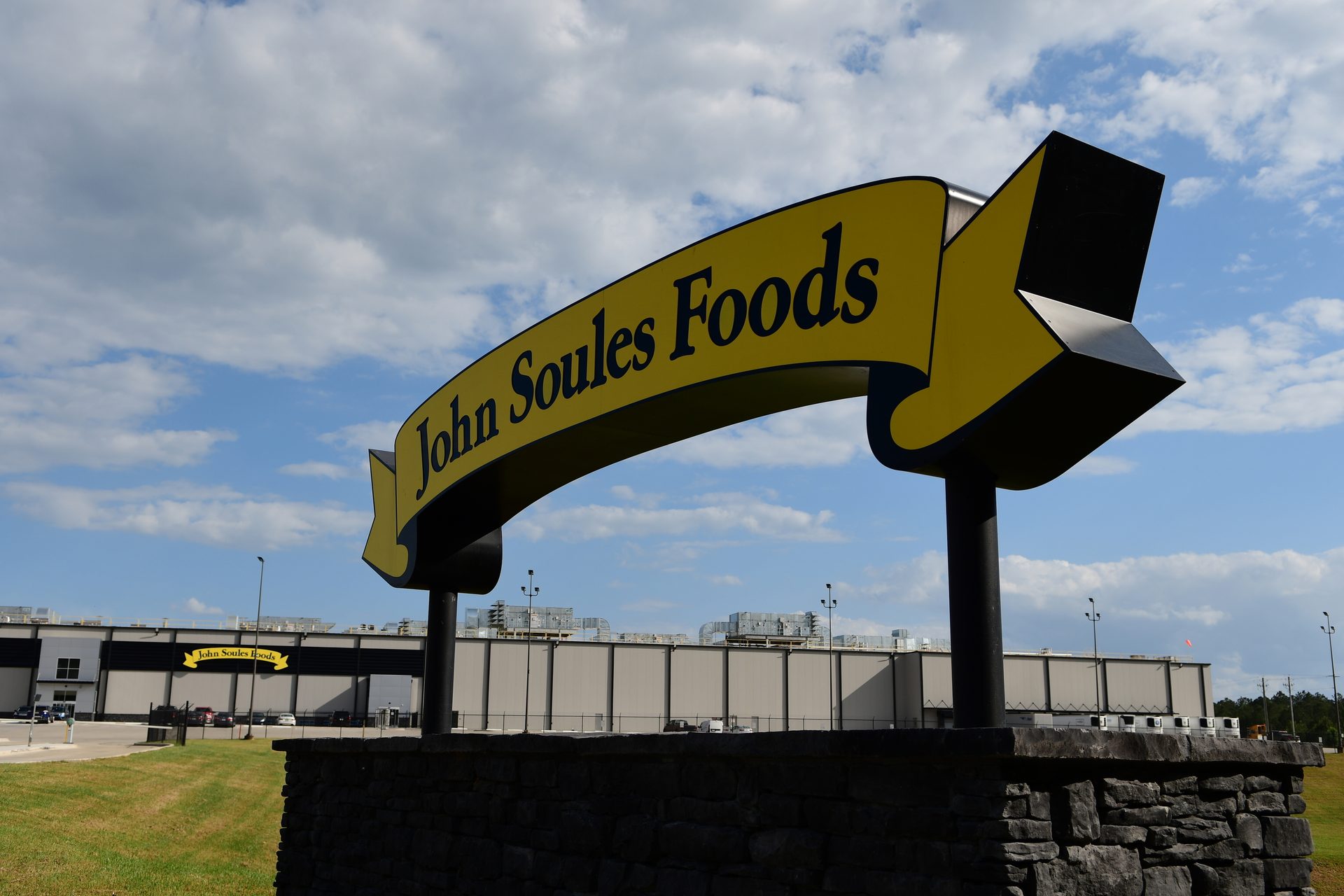
When expansion at the Valley, Ala., plant is complete, the operation will employ around 1,000 people. (Photo courtesy John Soules Foods)
Bama bound
In 2018, John Soules Foods bought the building that would become their Valley plant, intent on expanding production capacity to meet future sales growth goals. They considered expanding their Tyler, Texas, facility but decided the best course of action was to add a new production location that could replicate the production capabilities of both their Tyler (grilled items) and Gainesville, Ga., (breaded items) facilities.
“Valley serves as a very important backup for us,” John Jr. says. The Valley plant increases short-term capacity by about 50%, adding up to 100 million pounds of annual capacity on two new lines (on top of the 200 million pounds of capacity in their Tyler and Gainesville facilities).
The empty facility purchased in Valley — the layout of it, how it was constructed, the fact that the structure was more of a rectangle than a square, the site’s location in the southern part of the United States, the proximity to suppliers — made it a perfect building block for what they wanted in their new plant, John Jr. explains.
“We looked from Texas all the way to South Carolina really, and this was just the building that kind of jumped out to us,” he says.
They also found cooperative development partners among state and local officials, Chief Operating Officer Tom Ellis says.
“The City Council and the mayor have really embraced John Soules Foods coming to the community,” Ellis says, with the plant diversifying the area’s manufacturing base, expanding the sales tax revenue base and adding almost 400 jobs to the community.
When expansion at the Valley plant is complete, the operation will employ around 1,000 people, John Jr. says.
The City Council and the mayor have really embraced John Soules Foods coming to the community,” Ellis says, with the plant diversifying the area’s manufacturing base, expanding the sales tax revenue base and adding almost 400 jobs to the community.
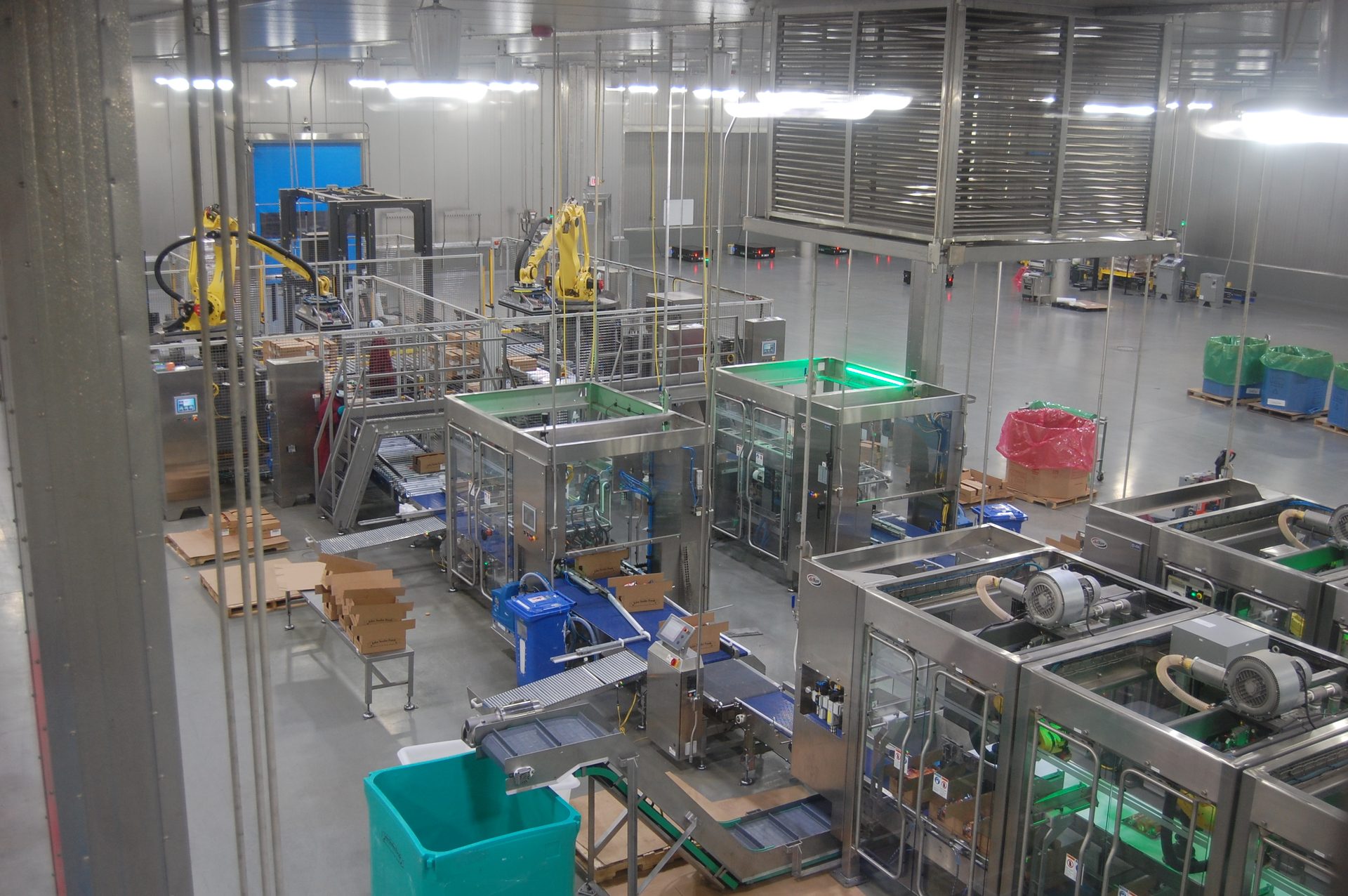
The Valley plant incorporates robotic equipment to erect boxes, place packages into boxes, close boxes and palletize boxes. (Photo by Andy Hanacek)
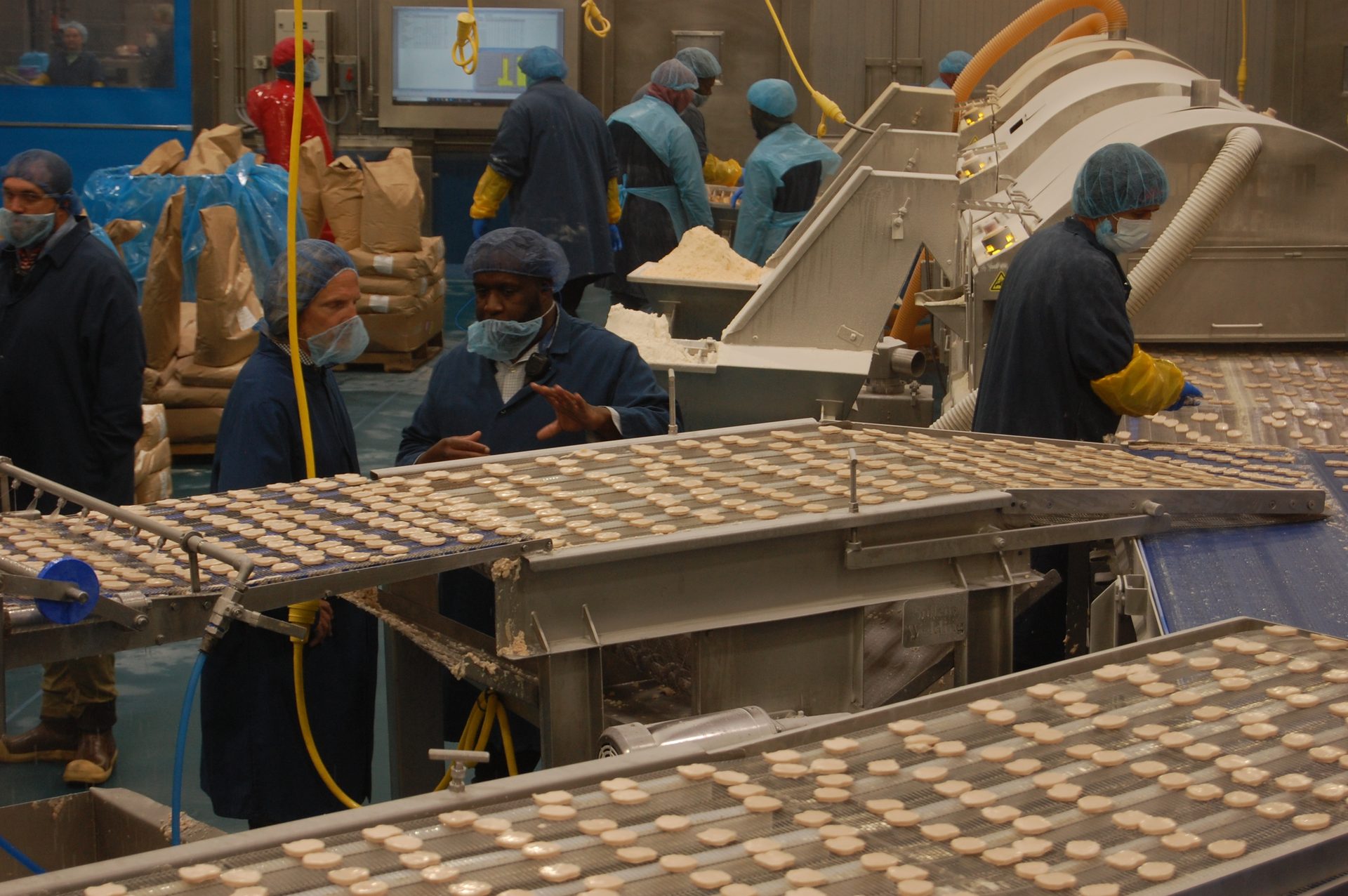
Operations in Valley increase short-term capacity by about 50%, adding up to 100 million pounds of annual capacity on two new lines. (Photo by Andy Hanacek)
Fashioning the facility
“We decided to start building it right before COVID hit,” John Jr. says. “So that was a nightmare, to say the least. That delayed us until basically mid-2020 before we could really start.”
In addition to COVID-related challenges regarding sourcing building materials, along with associated price increases, John Soules Foods’ major expansion coincided with related labor supply issues.
That led to incorporating some automation that wasn't in their original budget.
“All of the automation equipment wasn't originally in the plans,” John Jr. says. “After seeing the impact of COVID on labor supply, we knew we needed that.”
The Valley plant incorporates robotic equipment to erect boxes, place packages into boxes, close boxes and palletize boxes. Mobile industrial robots then pick up the loaded pallets and deliver them to the shipping staging area.
While the automation is impressive, an implementation of this scale isn't completed without some hiccups.
"We've seen some little mistakes and made adjustments. We have a few more to go, and by the fall we expect this to be one of the most efficient plants out there with the mix of robotics and labor," John Jr. says.
One of the big decisions was which oven to use. John Soules Foods had one type of oven operating in Gainesville and another type in Tyler. Also, the Valley production line could run 40% to 50% more product, about 15,000 pounds an hour compared with 10,000 pounds an hour each at the Tyler and Gainesville plants.
They had to figure what cooking setup could accomplish that, and then what automation on the back end could handle those speeds. Senior Director of Operations Greg Nichols worked with vendors to figure out layout configurations and bag speeds, what kind of packaging to use and how to employ robotics.
“We’ve had a steep learning curve with how to handle the speeds at which these lines can run,” Nichols said. “The transition from the cook line to packaging is the current bottleneck. Our equipment is capable of running at higher speeds, but the products are coming so fast to the packaging side, we keep it pulled back a bit.”
According to John Jr., the Valley plant should be running close to 80% to 90% of those speeds in the near future. Once they get up to full speed with the lines currently in place, putting in new lines should be similar and those add-ons should go more smoothly than the startup at the plant, he says.
“Valley is far beyond Tyler and Gainesville,” Nichols says. “And at the same time, we are learning from what we have purchased and installed here and looking at opportunities at those other two facilities to try to move toward more automation.”
Other Valley facility construction highlights include:
- 100% stainless steel drain systems
- 100% stainless steel conduits in the plant
- stainless steel walls and ceilings, even in the raw areas
- airtight and watertight wall curbs and transitions to stainless steel wall panels
- no air-handling/conditioning units suspended in the processing areas.
To ensure food is free of pathogens, a plant-wide misting system fogs processing rooms with a no-rinse, 24-hour residual protection designed to kill Salmonella, Campylobacter and Listeria, along with COVID. Bipolar ionization kills any incoming airborne viruses in air handling units that might make it through the HEPA filters.
“Our micro counts here have been better than at our other facilities just because of the way that we designed it … and how well everything flows,” John Jr. says.
With Phase One complete, work on Phase Two — the addition of two more production lines — is already ramping up because of rapid sales growth, Ellis says.
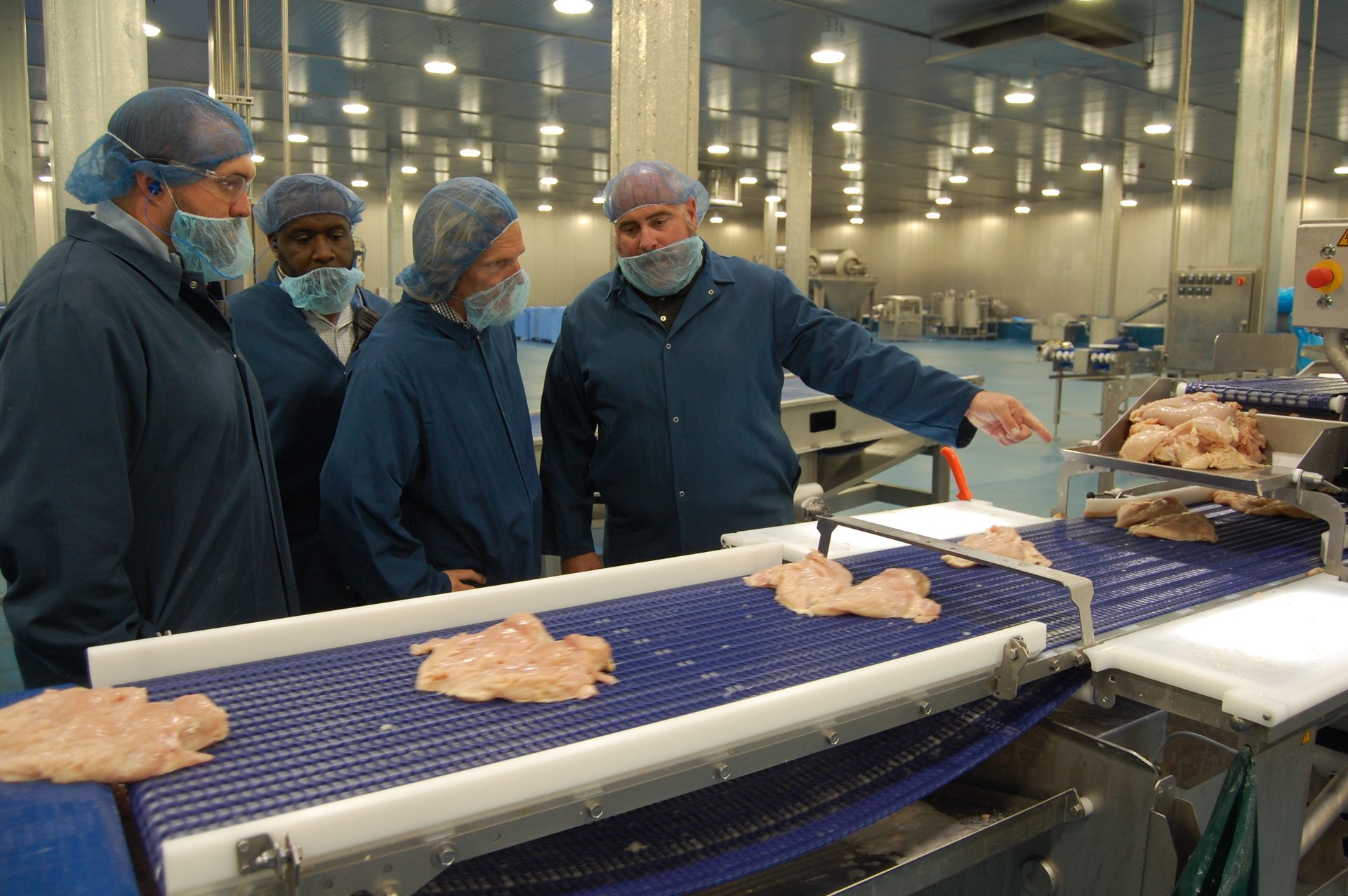
Plant Manager Cohan Sharp (from left), Production Manager Craig Allen, National Provisioner Managing Editor Fred Wilkinson and Senior Director of Operations Greg Nichols check out a chicken breast processing line. (Photo by Andy Hanacek)
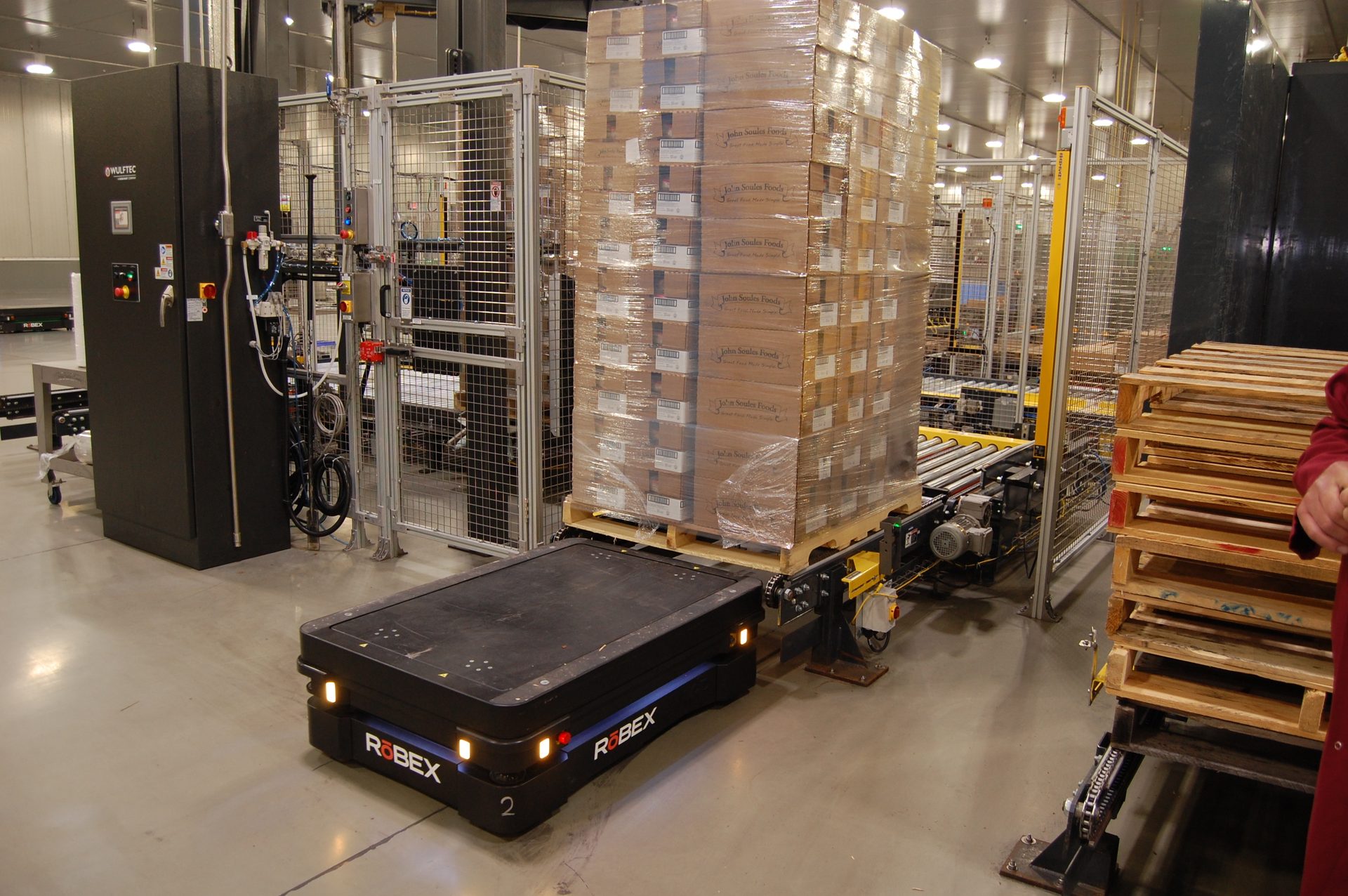
Mobile industrial robots pick up loaded pallets and deliver them to the shipping staging area. (Photo by Andy Hanacek)
Finding opportunities
Executing a major expansion amid the COVID-19 material and labor shortages wasn’t ideal timing to say the least, but it wasn’t the first time that challenging times wound up helping John Soules Foods grow.
In 1994, when a fire occurred at the original John Soules Foods’ Tyler facility, the company had two plants. Because of the fire, all they could run was the value-added plant, John Jr. says. Around that time, Mark Soules got a call asking if they could make raw marinated fajitas for retail like they did with foodservice. That one phone call opening the door to retail would forever change the company's trajectory, leading to a shift toward fully cooked proteins and a booming retail business.
“Retail is 50% of the business now,” Mark says.
Another crisis that became an opportunity was the Great Recession in 2008.
“It scared us to death because we had just doubled the size of the facility in Tyler,” Mark recalls. “When you double the size of your facility, you also double the expenses and … we didn't know what the recession would do. Because a lot of our business at that time was still in foodservice.”
However, the company was positioning itself more toward retail growth at that time, John Jr. adds.
“Retail growth was really the purpose behind the expansion,” he says. "And then what happens in a recession? Nobody eats out, everybody eats at home and our retail brand just really took off at that point.”
As tight labor availability continues to hamper the restaurant business — this time because of the COVID-19 pandemic and its aftermath — fully cooked products are attracting new attention from restaurant chains.
“Restaurants can't get employees either. So what's their option? To go to fully cooked,” Mark says.
As a result, John Jr. says, restaurant chains that John Soules Foods hasn’t partnered with in the past have approached the company to inquire about trying some fully cooked products in their stores.
“If you look at major turning points, even the ones perceived as more negative at first — the fire in 1994, the financial crisis in 2008 and then COVID — we've done better in the bad times,” Mark says. “You're going to go through a time in your business life that feels like you're going through hell. I don't care who you are or what you do, but you keep on going. Don't slow down. Intensity makes up for a lot of sins.”
With that company history in mind, Mark finds the idea of setting and sticking to a “five-year plan” to be overrated most of the time.
“You can't plan for a pandemic,” he says. “You don't plan that, and because people stay at home, most restaurants were closed, except for some takeout. We had the No. 1 brand of refrigerated fully cooked chicken. And because of that, I think we picked up a lot of traction on sales because people weren't going to the restaurants and they helped build the brand. So now, half of the United States that goes and buys fully coohked grilled chicken, over 50%, are buying our product.”
The road ahead
Even as John Soules Foods gears up for its Phase Two expansion, company leadership is looking down the road with plans for Valley.
John Jr. says the company has plans to install three more lines in Valley, then is likely move on to other opportunities for growth.
“I see both brick and mortar expansion and acquisitions still coming,” he explains. “Tyler does actually have the ability to expand. We've got about 67 acres there, and we're not on a huge portion of that. So that's the brick and mortar side. As for acquisitions, we're just going to wait and see.”
It should be no surprise that the company founded in beef but having grown into a multi-species processor might expand to other categories.
“I think you'll see John Soules Foods not necessarily be all protein-based in the future,” John Jr. says. “I see us being a food company that is extremely diversified in our product offerings.”

